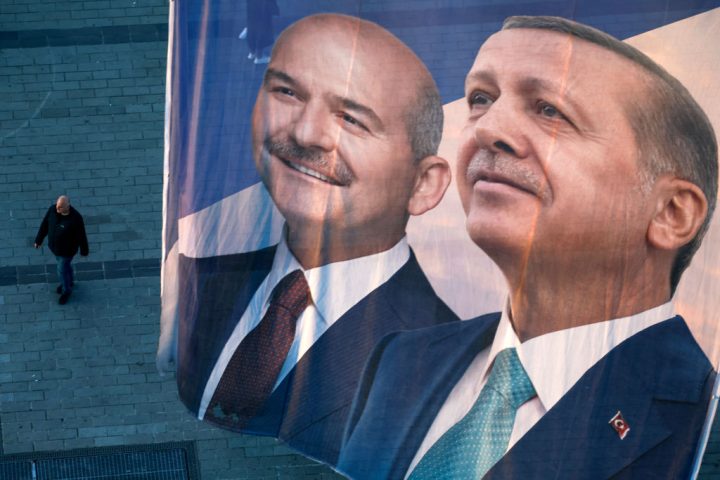Turkey is a strange kind of democracy. But nonetheless it is a democracy where an apparently invincible strongman can – in theory at least – be deposed after two decades in power by the will of the electorate.
With over 99 per cent of the votes of Sunday night’s presidential vote counted, it looks like neither the 69-year-old Erdogan nor his challenger, the 74-year-old veteran leader of the Republican People’s party (CHP) Kemal Kilicdaroglu, have managed to break the required 50 per cent threshold to prevent a runoff. Erdogan is currently on 49 per cent, according to estimates by the official Anadolu Agency, while Kilicdaroglu is on 45 per cent. There are only two million ballots still to be accounted for, which leaves the third candidate, ultranationalist Sinan Oğan, with about 5 per cent of the vote (up from a pre-election estimate of 1 per cent) as a potential kingmaker in a runoff in two week’s time.
A vote against Erdogan would be a plunge into the unknown for the majority of Turks
President Recep Tayyip Erdogan’s opponents have regularly described him as a dictator, and his supporters know him as ‘The Sultan’. In the aftermath of an attempted military coup in 2016, Erdogan jailed tens of thousands of suspected plotters, fired 150,000 officials and army officers and increased state control of Turkey’s media to over 90 per cent. And yet in Sunday’s presidential and parliamentary elections, Erdogan has come perilously close to being unseated by an electorate furious at galloping inflation and years of government corruption that contributed to the estimated 50,000 death toll from a catastrophic earthquake in February.
Sunday night’s vote came down to a nail-biting finale, where official estimates of a decisive Erdogan win – fuelled by early vote counts in generally pro-Erdogan rural areas – were steadily eroded by results from the big cities where discontent against the ruling Justice and Development party (AKP) runs stronger. Local AKP election managers also adopted a tactic of routinely filing recount appeals in voting precincts where Kilicdaroglu had shown strong results. That meant an apparent 72 per cent pro-opposition vote in Diyarbakir, a majority Kurdish city in southeastern Turkey, was not immediately uploaded onto the official electoral system.
A vote against Erdogan would be a plunge into the unknown for the majority of Turks who have spent their adult lives under his rule. But his challenger Kilicdaroglu – the loser of eight previous elections and referendums against Erdogan – managed to unite six fractious opposition parties as a united candidate. Famously modest and professorial compared to Erdogan’s macho image as the ‘reis’, or ‘captain’ of the country, Kilicdaroglu is seen as a safe pair of hands after years of political repression and conspiracy theorising by Erdogan, who often blames the country’s 40 per cent year on year inflation rate and other economic problems on international cabals.
But many Turks – especially from the conservative and religious Anatolian heartland of Turkey – also venerate Erdogan for tripling the country’s GDP in his years in power and bringing the country regional influence and heralding what Erdogan describes as ‘the Turkish century’. This core vote has also been boosted by two decades of shameless promotion by the AKP of its supporters to positions at every level of the Turkish state, from local policemen to judges, prosecutors and local officials, creating a payroll vote tens of millions strong. Erdogan’s social conservatism, from encouraging Islamic headscarves as the norm in government offices (they were illegal when he came to power) to Friday prayers becoming de rigueur for state employees (unheard of two decades ago), are also popular among working class, small town Turks.
The AKP’s deep local popularity, in spite of discontent with Erdogan over economic woes, has been reflected in Sunday’s other vote, to elect a new Turkish parliament. In this race, Erdogan’s People’s Alliance (a coalition of the AKP and its nationalist the MHP) appears on track to become the largest block, with 49 per cent of the vote. The opposition Nation Alliance, led by Kiliçdaroğlu’s CHP, had just 35.6 per cent of the vote.
That means that even if Erdogan loses the presidency, his party’s dominance in parliament will gridlock Turkey’s future governance at a time when IMF-recommended deep austerity measures and a huge hike in interest rates are sure to cause economic pain and generate political unrest.
But Erdogan’s fall remains a big ‘if’. With the enormous resources of the state at his disposal, Turkey’s ‘Sultan’ is likely to double down on blatant electoral bribes, such as his recent promise to hike state worker’s pay by 45 per cent. With Turkey’s media, bureaucracy and judiciary at his beck and call, Erdogan’s powers are vast.
The opposition, meanwhile, can hope that the Reis will overplay his hand and produce a similar result to Istanbul’s mayoral elections in 2019, when an AK-disputed re-run produced a resounding win for the opposition candidate. The final result will impact Turkey’s future relationships with the EU, Russia and the Middle East – as well as determine whether Turkey’s Islamic course will deepen or reverse. The stakes could hardly be higher.







Comments